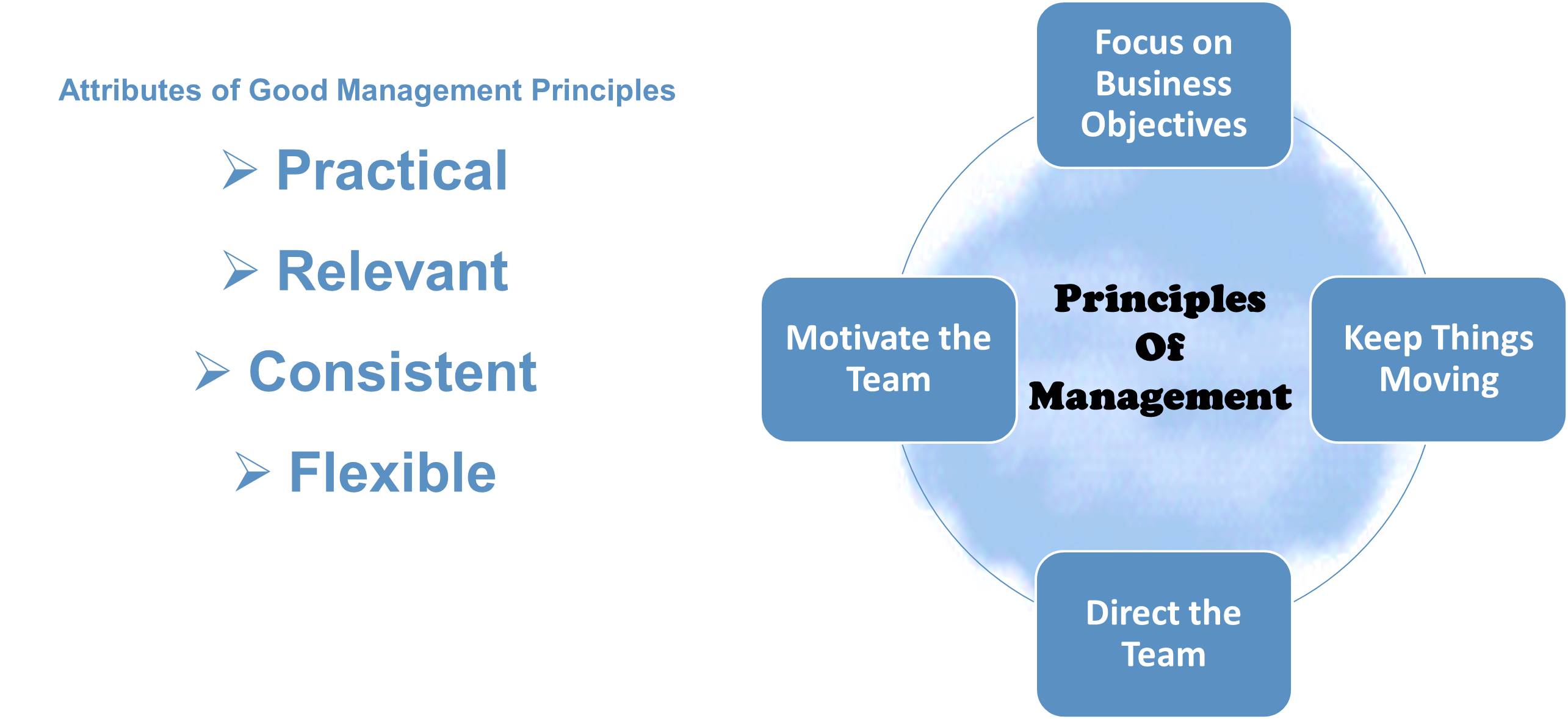- Home
- Business Processes
- Industry Knowledge
- Aerospace Industry
- Automotive Industry
- Banking Domain
- BFSI Industry
- Consumer/ FMCG Industry
- Chemicals Industry
- Engineering & Construction
- Energy Industry
- Education Domain
- Finance Domain
- Hospitality Domain
- Healthcare Industry
- Insurance Domain
- Retail Industry
- Travel and Tourism Domain
- Telecom Industry
- Leadership Skills
- eLearning
- Home
- Leadership
- Leadership & Management
- Principles of Management
Principles of Management
Principles of management are fundamental concepts and advisory guidelines for managerial decision making. By using management principles, managers can more easily achieve the objectives and avoid making mistakes in their activities. Management principles can be applied to any kind of organization and to managers at all organizational levels.
A principle can be defined as a fundamental statement of truth providing a guide to thought or action. Principles help to understand what results can be expected when a particular management principle is applied. These management principles emerge based on certain qualities/characteristics that have relevance to management theory and practice.
Principles of management are to the manager as a guidebook of strengths and weaknesses which provides fundamental truths, expressed as quantitative data based on years of experience and testing. The manager can use these principles to take timely guidance for various management issues as these management principles have been developed from years of experience and testing, in public and private, in big and small organizations. By using management principles, managers can effectively achieve business objectives and avoid making fundamental mistakes in their actions and decisions. They are basic guides and a framework for reference but not absolute as managers need to take actions based on the context in which they operate. They are like working hypotheses that are reasonably well established, accepted, and used in many successful organizations, and managers must adapt them to their specific situation.
As more research is conducted, we gain more understanding of the way management principles operate; new principles will emerge, some existing management principles will get modified, and some others will be discarded not being truly representative of management practice in today’s context.
Henri Fayol (1849-1925), a French industrialist and a prominent European management theorist, developed a general theory of management. Fayol outlined the fourteen principles of management. Given below are some of the other attributes of good management principles:
- Practical: Management principles should have a practical application, which means they can be applied in the organizational context and remain appropriate
- Relevant: Management principles should not be restricted to one business scenario but they should be invariably applicable to the various broad forms of organizational structures and different businesses operating in different business domains.
- Consistent: The management principles should be consistent in their applicability and application meaning thereby that under a similar set of circumstances, similar business results can be expected.
- Flexible: Business operates in different environments and has multiple types of products and services. They build different operational and organizational structures. Management principles should take into accounts the particular differences or changes in the conditions that affect the organization. The use of management principles is intended to simplify, guide, and facilitate management work.

Therefore, management principles are a guiding key to actions that should be taken in a particular business context. They provide the guidelines from which the manager can understand the situation and recommended action and apply that in his particular context. They represent the major considerations in current management thought.
Given below are some of the important principles of management that will help you to build a better understanding of the management process:
Focus on Business Objectives
Management is always purposeful focused on the achievement of specific business objectives and goals. Managerial success is measured by the extent to which these objectives have been met. Management should keep a continued focus on the work needed to be accomplished.
Keep Things Moving
Management is responsible for making things happen and meet business goals. Managers should focus their efforts on bringing about successful action as per the vision and mission of the organization. They must provide direction to set goals, keep things moving, follow through to ensure members of the group accomplish the task they have been assigned.
Directing the Team
Management is accomplished by managing the team. The manager needs to relinquish the natural tendency to perform all things oneself and should focus on getting the tasks accomplished through the efforts of the group members. Management is thus associated with the efforts of the group. A group is necessary to accomplish business goals as an enterprise comes into existence to attain these goals, and these goals can be achieved only through group effort rather than by one person alone.
Motivating the Team
Management is an outstanding means for exerting a real impact on human, social, and political life. A manager can do much to improve the work-environment he operates in and the resources he deals in. A manager must stimulate and motivate people to do things better, and in the process should assist favorable organizational actions to take place. A manager can achieve progress, bring hope, and help group members acquire the better things in life.
These principles of management will definitely help you in discharging your roles and responsibilities as a manager. Understanding these principles will also broaden your understanding of the theories of management that every manager should be aware of.
Suggested Reading and Resources
Related Links
You May Also Like
-
In today's innovation-driven economy, understanding how to generate great ideas has become an urgent managerial priority. Managers need to encourage and champion ideas and need to help their organizations incorporate diverse perspectives, which spur creative insights and facilitate creative collaboration by harnessing new technologies. Innovation is the embodiment, combination, and/or synthesis of knowledge in original, relevant, valued new products, processes, or services.
-
Modern Approaches to Management
The modern approaches to management look at organizational management in the current context. They take a holistic approach and look at organizations as a collection of interrelated parts influenced by both internal dynamics and also the larger external environment. These modern management theories have played a significant role in the evolution of management studies.
-
Emergent leadership occurs when a group member is not appointed or elected as leader, but rather that person steps up as the leader over time within-group interactions. Have you ever faced challenges in getting accepted into your new role of position as a leader? Groups don't automatically accept a new "boss" as a leader. Emergent leadership is what you must do when taking over a new group. Learn more about emergent leadership.
-
Taylor’s Scientific Management
Taylor’s theory of scientific management aimed at improving economic efficiency and labor productivity. Taylor had a simple view that money motivated people at work. He felt that workers should get a fair day's pay for a fair day's work, and that pay should be linked to the amount produced. He introduced the differential piece rate system, of paying wages to the workers.
-
McClelland's Theory of Needs is a human motivation theory which states that an individual's specific needs are acquired over time through our culture and life experiences. As per the three needs theory, these acquired needs significantly influence the behavior of an individual. The three main driving motivators are the needs for achievement, affiliation, and power.
-
Management Principles by Fayol
Henri Fayol (1849-1925), a French industrialist and a prominent European management theorist, developed a general theory of management. Fayol outlined the fourteen principles of management.
-
Max Weber gave the theory of Bureaucratic Management in 1915. Bureaucracy is a specific form of organization defined by complexity, division of labor, professional management, and hierarchical management control. Weber's theory has two essential elements - organizational hierarchy and rules-based management. Weber made a distinction between authority and power and advocated that authority must be given to the most competent and qualified people.
-
Many different types of teams have been identified by social scientists. Managers may encounter the diverse types of challenges while managing different kinds of teams. Challenges associated with Cross-Functional Teams might be different from that of a Geographically Dispersed Team or a Virtual Team. This article explores some common categories and subtypes of teams.
-
The ten most important qualities that define a good leader are self-awareness, interpersonal and communication skills, ethical values, organizational consciousness, self-confidence, adaptability and flexibility, imagination and creativity, focus & result-orientation, continuous self-development and accountability and ownership for his actions. These ten qualities of leadership every good leader should possess to a certain extent and must continually strive to develop them.
-
Have you ever resonated that there seem to be as many different ways to lead people as there have been great leaders? When we recall the success of Mahatma Gandhi, Nelson Mandela, Abraham Lincoln, Napoleon Bonaparte to Steve Jobs and Jack Welch, we also notice that they all used different approaches that were suitable to their specific situations and circumstances. Over the last century, researchers and psychologists have developed simple ways to describe the “Styles of leadership” and in this section, we will explore these commonly known leadership styles.
Explore Our Free Training Articles or
Sign Up to Start With Our eLearning Courses

About Us
Learning
© 2023 TechnoFunc, All Rights Reserved










